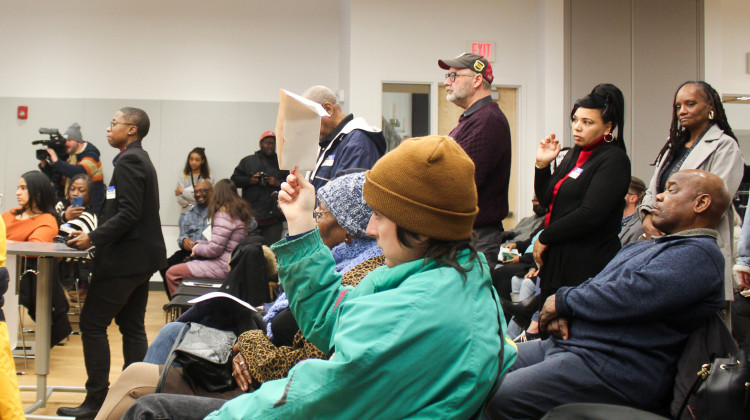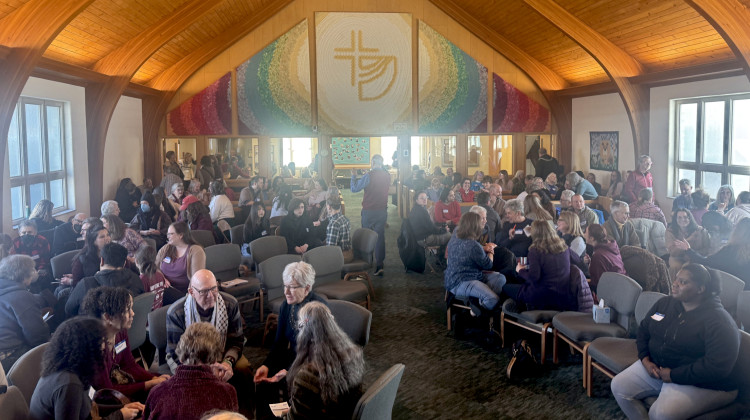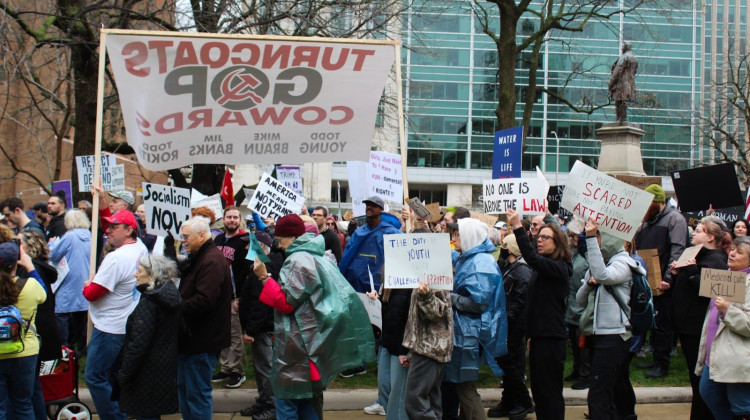
Fort Wayne, Ind. barber Trey Cato, 47, says the clients he serves, like Caleb Green, treat him as a confidant.
PHOTO PROVIDED BY TREY CATOWhere there is a mirror and barber chair, Trey Cato sees a ministry.
“We’ve prayed in my barbershop,” he says. “The kids are not going to church, but they're going to get a haircut. When we come together and listen to these people, I believe we can change the community.”
Driven by that dedication to change, the Fort Wayne barber is part of a national coalition of haircutters trying to improve the health of Black men. Operating under a vision that they are “more than a pair of clippers,” national nonprofit The Confess Project is helping Black barbers talk about mental health, one client at a time.
“The barbershop is the Black man's country club,” Cato says. “It’s where we can talk without being judged.”
At his 2K Tight barbershop on the city’s south side, you’ll likely hear Cato candidly chatting about being a 47-year-old, divorced father of five. And you get the sense his frankness is as strong as his faith in God. That’s because Cato speaks highly of his 15-year marriage, even though it eventually ended.
“I’m a walking asset and I’m proud of that,” he says. “I’m not ashamed to tell people my faults, because I don’t want you to make the same mistake.”
Cato says he sees one client at a time to adhere to social distancing guidelines during the coronavirus pandemic. That intimacy has led to deeper discussions.
Alicia Mckoy, CEO of PEAKmind LLC in Indianapolis, says the pandemic has left many people with a blurred line between work life and home life.
“Now our emotions are even more entangled,” says Mckoy, who helps businesses address the mental well-being of their employees. “Black males as we know are dealing with racial tension in addition to normal stressors and financial burdens of a pandemic.
“Mental well-being has traditionally not been talked about openly, but being in the middle of a pandemic, mental well-being cannot be overlooked.”
Prior to the pandemic, Mckoy says, research shows employee assistance programs that offer support such as counseling, were often underutilized, with less than 10% of employees using them nationwide.
Now, more Indiana communities are bringing resources to places where marginalized Black men feel safe. The ultimate goal is to connect clients with equitable and affordable mental health treatment.
The Confess Project recently included Fort Wayne as part of a virtual tour of partner barbershops. Organizers say the group teaches barbers how to be mental health advocates, not counselors — and shows them how to replicate the program in their communities for free.
Darnell Rice, membership director for the project, says Fort Wayne was a crucial tour stop because of the area’s economic disparities. A 2018 study of Allen County found that in the 46806 zip code where Cato’s shop sits, about 38% of residents in the majority Black area live below the federal poverty line.
“We lash out because we don't have affordable [mental health] services,” Rice says. “The barbershop is a safe space to come and get real and uncut. I will trust my barber with my deep concerns.”
He says Black men tend to rely on family, religious and social communities for emotional support rather than turning to health care professionals — even when that’s necessary. The Confess Project often sets referral agreements with medical providers that barbers can pass along to clients.
A similar program — the Indiana Black Barbershop Health Initiative — has been operating for a decade. The Indiana Commission on the Social Status of Black Males created it to encourage Black men to be proactive about their healthcare, including mental health.
“The barbershop has been called the Black man’s country club and we simply choose to discuss health … and change the paradigm for black males,” says James Garrett Jr., executive director of the commission.
The U.S. Department of Health and Human Services Office of Minority Health reports poverty affects a person’s mental health, and Black Americans living below the poverty level are twice as likely to report psychological distress. The latest federal data shows the suicide rate for Black men is more than four times greater than for Black women.
Black men have the highest mortality rate in the state, Garrett says, adding that thousands of them have received health screenings through the commission’s health initiative.
“When our patrons sit in that barber chair, [barbers] hear many things that are going on in their life,” he says. “We've got the barbers to engage the patrons, asking, ‘How have you been feeling? Have you been sleeping well; have you been depressed?’”
Barbers in both community programs are trained to ask similar questions to “debunk the myth” that mental health is a shameful topic, Garrett says.
Experts say any effort to remove the stigma of mental health discussions in the workplace is encouraging. Mckoy says interested employees can advocate for better mental health programs by telling employers that the programs can help them be more productive.
Rice tells coalition members confidential chats with clients are also good business because they forge long-term bonds.
Look no further than Cato’s chair for proof. It’s where he’s watched some clients go from children to parents over the last three decades — while listening carefully to their concerns.
“My shop is a safe haven,” Cato says. “I try to build relationships; I try to speak life.”
This story was produced by Side Effects Public Media, a news collaborative covering public health.
 DONATE
DONATE






 Support WFYI. We can't do it without you.
Support WFYI. We can't do it without you.